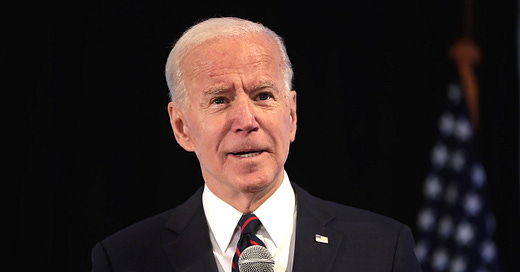The New World Order: Biden's Dangerous Vision for Israel-Palestine
With the induction of Middle Eastern states into BRICS, Biden's push for a new world order imposed from above, rather than built through cooperation, endangers Israel-Palestine and the world.
"We need a new, new world order in a sense," declared President Biden recently at a campaign event, promoting his vision to reshape the global order as the old system has "run out of steam." This startling statement, largely ignored by the mainstream media, carries ominous implications for the Israel-Palestine conflict.
Biden's words echo the "New World Order" proclamation of his former boss, George H.W. Bush, after the Cold War's end. But while Bush referred to cooperation between world powers, Biden's emphasis on the "need" for a new order suggests a unilateral and coercive approach that should deeply concern all who value justice and human rights.
Nowhere are the risks greater than in Israel-Palestine, the decades-long human rights catastrophe enabled by uncritical U.S. support for Israeli aggression. With the recent induction of Middle Eastern states into the BRICS alliance, the region has become a geopolitical powder keg. Biden's drive for a new world order, imposed from above rather than evolved through cooperation, threatens to ignite this combustible situation with disastrous consequences.
The horrific bombing of Gaza hospitals, the killing of journalists, and the swelling refugee crisis reveal the urgency of the situation. Yet the Biden administration blocked a UN ceasefire resolution, preferring to enable further bloodshed rather than pursue diplomatic solutions. The refusal to hold Israel accountable will only worsen conditions for Palestinians while fanning the flames of extremism.
The U.S. pretense of being an "honest broker" between Israel and Palestine suffered another blow recently with the announcement of the India-Middle East-Europe Trade Economic Corridor (IMEC). This effort to economically integrate Israel with Arab states exposes the U.S. priority of strengthening Israel's regional position rather than seeking justice. Can a party with such clear interests fairly mediate?
Meanwhile, the emerging BRICS bloc has demonstrated a principled approach rooted in international law and human rights. The BRICS bloc as a whole issued a resolution during its last summit in August, calling for a return to 1967 borders, urging a two-state solution based on UN mandates.
Yet Western media outlets have distorted BRICS unity, falsely portraying divisions. Such propaganda aims to frustrate BRICS' efforts to counter Western dominance through a partnership model of global cooperation. In reality, BRICS has demonstrated remarkable cohesion given the complex interests of its diverse members.
But will this cohesion withstand tensions as Middle Eastern conflicts intersect with great power rivalries? Much depends on whether BRICS pursues cautious neutrality or bold leadership. To fulfill its promise, BRICS must have the courage to follow its principles even when difficult.
The Israel-Palestine conflict has always held global significance, but the stakes are now higher than ever. With its drive for a new world order imposed from above, the United States risks triggering uncontrolled chaos. In contrast, the emerging partnership ethos of BRICS offers hope for peaceful change grounded in justice and human rights.
The path forward remains uncertain. Yet one thing is clear: ordinary citizens worldwide must demand moral leadership from their governments. Too often, narrow interests and unrestrained power hold sway. Now is the time for a new vision, rooted not in dominance but in cooperation and our shared humanity.
The choices made today will reverberate for generations in Israel, Palestine, and across an interconnected world. For the sake of our collective future, we must get these choices right.
"Think BRICS," an independent YouTube channel is a platform for geopolitical analysis that examines these complex dynamics in depth through thoughtful dialogue. We invite you to watch our latest video on the escalation of the crisis and participate in the critical discussion.
With wisdom and moral courage, a just peace is possible.





